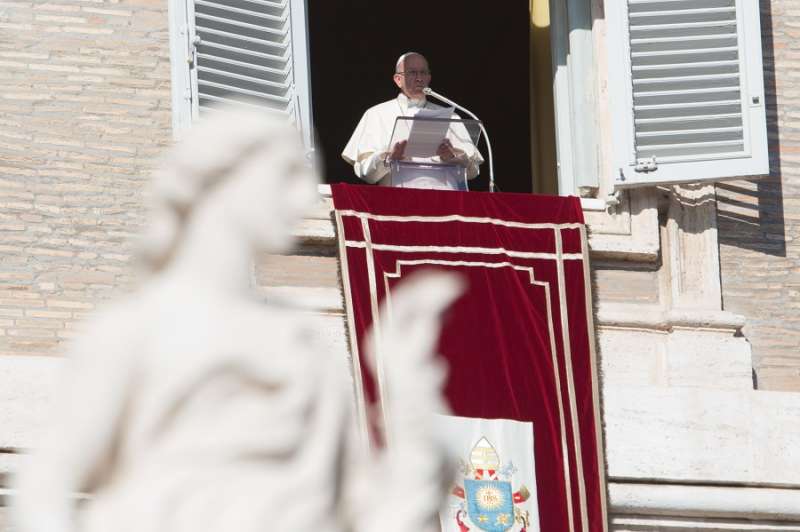Pope Francis said Sunday that God always surprises people with the way he works, and because of this, believers should be open to the Lord's way of thinking and acting, rather than expecting him to conform to their aspirations.
“Today the Lord invites us to assume an attitude of humble listening and docile waiting, because the grace of God often presents itself to us in surprising ways, which don't line up with our expectations,” the pope said July 8.
He noted how certain “prejudices” can be nurtured in Christians which prevent them from accepting the reality of how God works, however, “the Lord does not conform to prejudices. We have to force ourselves to open the mind and heart to welcome the divine reality that comes to meet us.”
Pope Francis spoke to pilgrims gathered in St. Peter's Square for his Sunday Angelus address, which focused on the day's Gospel reading from Mark. In the passage, Jesus returned to his native land to do ministry, but was unable to perform the same miraculous works he had done in other places since people knew him and were skeptical of his preaching and ministry.
In his speech, Francis said the people were “scandalized” by what Jesus was doing, since they recognized him as one of them.
Asking how it is possible for Jesus' fellow citizens to go from marvel to disbelief, the pope said this is because they made a comparison between the “humble origins” of Jesus and his current abilities to preach and perform miracles.
“He is a carpenter, he did not study, yet he preaches better than the scribes and performs miracles. And instead of opening themselves to the reality, [the people] are scandalized,” he said, noting that for the inhabitants of Nazareth, “God is too great to lower himself to speak through such a simple man!”
This, he said, is “the scandal of the incarnation: the shocking event of a God made flesh, who thinks with a human mind, works and acts with human hands, loves with a human heart; a God who struggles, eats and sleeps as one of us.”
However, in becoming flesh, Jesus “overturns every human scheme: it is not the disciples who washed the feet of the Lord, but it is the Lord who washed the feet of the disciples,” the pope said, noting that this fact is “a cause of scandal and disbelief in every age, even today.”
In off-the-cuff remarks, Francis pointed to St. Teresa of Calcutta, who he canonized in September 2016, as a modern-day example of someone simple who performed great works. Even though she was “a small sister,” St. Teresa through prayer and simplicity was able to “work wonders,” he said, adding that “she is an example from our day.”
Closing his address, Pope Francis said learning to have a mind and heart open to God's logic above all means having faith.
“The lack of faith is an obstacle to God's grace,” he said, noting that many baptized Catholics “live as if Christ does not exist: they repeat the signs and acts of faith, but they do not correspond to a real adhesion to the person of Jesus and his Gospel.”
Every Christian, he said, “is called to deepen this fundamental belonging, trying to bear witness with a coherent conduct of life, whose leitmotif is charity.”
After leading pilgrims in the traditional Angelus prayer, the pope gave a shout-out to patriarchs and representatives from Eastern Catholic and Orthodox churches in the Middle East who were present for an July 7 ecumenical gathering in Bari to pray for peace in the region.
Francis said the event was “an eloquent sign of Christian unity,” and thanked all those who participated.
He also noted how July 8 marks the “Sunday of the Sea,” which is dedicated to seafarers and fisherman, and prayed for them and their families, and for the chaplains and volunteers who do ministry to them.
The pope offered a special prayer for those who live at sea in situations of “undignified work,” and for all those who are committed to freeing the sea of pollution.

